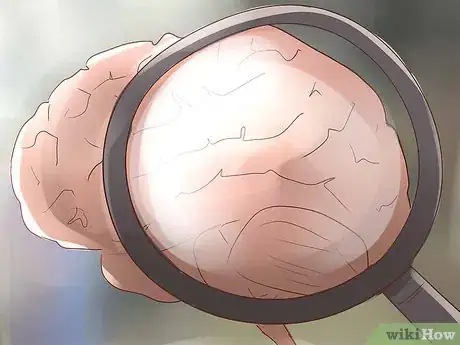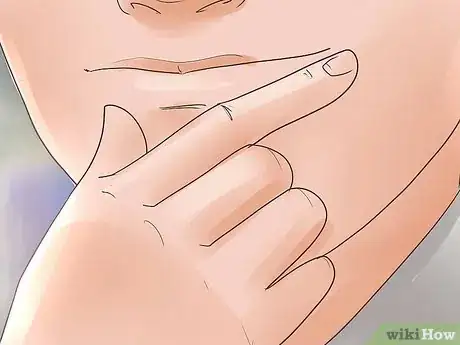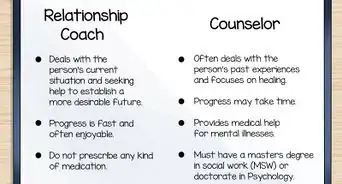This article was co-authored by Scott Nelson, JD. Scott Nelson is a Police Sergeant with the Mountain View Police Department in California. He is also a practicing attorney for Goyette & Associates, Inc. where he represents public employees with a myriad of labor issues throughout the state. He has over 15 years of experience in law enforcement and specializes in digital forensics. Scott has received extensive training through the National Computer Forensics Institute and holds forensic certifications from Cellbrite, Blackbag, Axiom Forensics, and others. He earned a Master of Business Administration from the California State University Stanislaus and a Juris Doctorate from the Laurence Drivon School of Law.
There are 7 references cited in this article, which can be found at the bottom of the page.
This article has been viewed 58,976 times.
The profession of forensic psychology combines psychology and criminal law. As a forensic psychologist, you will apply your skills to assess criminal offenders, assist inmates with their mental needs, and consult with law enforcement personnel and attorneys. You may also conduct research that focuses on the relationship between the law and psychology.[1] In order to become a forensic psychologist, you will need to first understand what is required and expected of you in this role. To enter the field, you will need to attain the necessary education and credentials, then look for a position.
Steps
Understanding the Role
-
1Be aware of the professional expectations of the role. The role of a forensic psychology has several aspects. You may be used in a criminal case to narrow down a suspect list or uncover evidence for a crime. You may also prevent crime by participating in the rehabilitation of criminals or conduct research on methods to reduce criminal activity.[2]
- You will need to have solid knowledge of psychological theory and practice as well as knowledge of the criminal justice system. You may be required to offer testimony in a court case as an expert witness and you may also offer expertise on issues in the private sphere, such as advice on personal injury, liability, disability, or guardianship.
- You may also evaluate and treat criminals, as well as families that are involved in abuse or neglect cases. You may work with victims as well as potential offenders and past offenders. Keep in mind that though you will be expected to analyze and assess criminals, you will not be expected to do criminal profiling. Many forensic psychologists do some form of profiling, but it is often more broad and general.
-
2Recognize the traits of a good forensic psychologist. Though you will need to be able to fulfill all the professional expectations of the role, you will also need to display certain traits to become successful as a forensic psychologist. In addition to maintaining a professional demeanor while working, you should also be able to perform certain intrapersonal skills, such as:[3]
- Problem solving: You should be proactive about coming up with solutions to a problem quickly and efficiently. You may need to change tactics mid-conversation as you talk to criminal suspects or testify in a courtroom and should be able to do this fluidly and easily.
- Patience and diligence: Forensic psychology research can be time consuming and may require more than one approach or attempt at a solution. You will also need to be diligent about talking to suspects multiple times or in different ways. In these situations, you will need to demonstrate patience and resolve in your role as you interview suspects and analyze your research.
- Strong observational skills: As a forensic psychologist, you will need to be observant of suspects as you question them so you can quickly deduce their motivation and their demeanor. You should also watch them closely as they respond to your questions and focus on key aspects that will help you build a better profile of them.
- People skills: In this role, you will be forced to work with many different individuals, from law enforcement officials like police to legal representatives like attorneys and judges. You will also need to engage with victims and criminals on an almost daily basis. Maintaining strong communication skills will allow you to navigate these relationships successfully.
Advertisement -
3Keep in mind the work environment and the pay scale. As a forensic psychologist, you may work in a variety of settings, such as police stations, courthouses, law firms, prisons, and juvenile detention centers. You may also work as a consultant and work from home or from an office.[4]
- Forensic psychology is considered a growing field and has risen in popularity due to television and film depictions of forensic psychologists. Salaries for forensic psychologist are often similar to traditional psychologist, who can earn around $86,000. A forensic psychologist salary can range from $68,000 to $90,000, depending on what area you work in and your level of expertise. If you become a consultant and are self-employed, you may earn a higher pay grade.[5]
Getting the Necessary Education and Certification
-
1Earn a bachelor’s degree in psychology, with a minor in criminal justice or criminology. You can major in psychology or you can major in criminal justice or neuroscience if it is offered at your chosen university. Your undergraduate education should focus on classes in psychology, criminology and forensics. Most undergraduate forensics psychology degrees take four years to complete.[6]
- Most psychology bachelor’s degrees cover a number of core psychology subjects such as the history of psychology, developmental psychology, cognitive psychology, social psychology, abnormal or clinical psychology, and psychology statistics and research methods.
- You may also take psychology electives that focus on personality psychology, educational psychology, and evolutionary psychology. You will also be required to take general coursework like math, science, art, composition, and literature.
-
2Get a master’s degree in forensics psychology. Forensic psychologists are expected to have a master’s degree and a doctorate degree. Some doctoral programs will accept applicants with only a bachelor’s degree in psychology, but most doctoral degrees will require a master’s degree as well. A master’s degree in forensic psychology will allow you to delve into applying forensic psychology in a mental health setting and in the community, plan programs and learn how to conduct evaluations in the field, and get a better sense of the relationship between psychology and the legal system.[7] [8]
- Most master’s degree programs take two years of full-time study or longer if you are a part-time student. Unlike your undergraduate degree, your master’s degree studies will be very concentrated and you will only be required to take courses in your focus area. You will do coursework in psychology and law, psychological profiling, psychology and conflict management, social and behavioral psychology, criminal behavior, and diversity and psychology.
-
3Complete a doctorate program in psychology. At the doctoral level, you can decide if you are going to work toward a Ph.D degree or a Psy.D (Doctor of Psychology) degree. Students usually enroll in a Ph.D. in psychology if they intend to do more research in the field. A Psy.D. degree is more geared towards students interested in working as practicing psychologists. Some universities offer doctorates in forensic psychology, but more universities offer doctorates in psychology or clinical psychology. It is then recommended that you take a forensic psychology specialization after you have completed the doctorate program.[9] [10]
- Most doctorate programs take five to seven years to complete, and usually include a one year internship in a criminal justice or forensic facility. You will also need to select a course of study for your dissertation, which will likely focus on a topic in the forensic psychology field.
-
4Pass the licensing exam in your state. All states require licensing in order to practice as a forensic psychologist. The requirements will vary from state to state but all candidates should pass a licensure exam.[11]
- Talk to your doctorate program advisor about the licensure exam in your state and the contents of the licensure exam so you are prepared to take it when you complete your doctorate degree.
-
5Become board certified through the American Board of Forensic Psychology. It is strongly recommended that you become board certified as a forensic psychologist through the American Board of Forensic Psychology (ABFP), which is overseen by the American Board of Professional Psychology. To qualify for the ABFP certification, you must have a doctoral degree from a professional psychology program and be licensed to practice in your state. You must also complete at least 100 hours of formal education and 1,000 hours of practical experience in the field.[12]
- To become board certified, you must take certification examination that consists of a written section, two practice samples, and an oral section. The written section contains 197 multiple choice questions that test the depth and breadth of your forensic knowledge. You will then need to submit two practice samples that will be reviewed and used for the oral section of the exam. The oral section will require you discuss and analyze the two practice samples to demonstrate your understanding of forensic ethics and the relationship between the law and forensics.
- More detailed information about the board certification exam can be found on the ABFP website: http://www.abpp.org/i4a/pages/index.cfm?pageid=3443.
Finding a Position
-
1Look for a postdoctoral fellowship. The job market for psychology can be competitive, so a postdoctoral position, or a “postdoc”, can help to boost your credentials and make you more appealing to employers. If you are more research focused in your forensic psychology studies, you may apply for postdocs available at major universities in your area and across the country.[13]
- Most postdoctoral fellowships last for one to two years and require you to work on grant-funded research at a large university.
-
2Consider applying for a position through your doctoral internship. If you completed an internship at an educational facility or a legal facility during your doctoral degree, you may consider using your connections there to try to land a paid position. Creating strong professional ties with your supervisors and contacts during your internship could help to expose you to career opportunities once you complete your doctorate degree.
-
3Apply for positions in the legal system. If you hoping to work in the legal system, you may want to apply for positions in settings like prisons, rehabilitation facilities, law firms, police departments, and local and state government agencies. Often, as a newly hired psychologist, you will need to complete on the job training under a supervisor before you can go out into the field.[14]
- When applying for positions in the legal system, you should stress your intrapersonal skills, such as your observational skills, your communication skills, your problem solving skills, and your ability to analyze forensic information. You should also list your complete educational background and any internships or postdoc fellowships you have completed. You should include your dissertation topic in your resume, especially if it relates to forensic psychology in a legal setting.
Expert Q&A
-
QuestionWhat will make it easier to become a forensic psychologist?
 Scott Nelson, JDScott Nelson is a Police Sergeant with the Mountain View Police Department in California. He is also a practicing attorney for Goyette & Associates, Inc. where he represents public employees with a myriad of labor issues throughout the state. He has over 15 years of experience in law enforcement and specializes in digital forensics. Scott has received extensive training through the National Computer Forensics Institute and holds forensic certifications from Cellbrite, Blackbag, Axiom Forensics, and others. He earned a Master of Business Administration from the California State University Stanislaus and a Juris Doctorate from the Laurence Drivon School of Law.
Scott Nelson, JDScott Nelson is a Police Sergeant with the Mountain View Police Department in California. He is also a practicing attorney for Goyette & Associates, Inc. where he represents public employees with a myriad of labor issues throughout the state. He has over 15 years of experience in law enforcement and specializes in digital forensics. Scott has received extensive training through the National Computer Forensics Institute and holds forensic certifications from Cellbrite, Blackbag, Axiom Forensics, and others. He earned a Master of Business Administration from the California State University Stanislaus and a Juris Doctorate from the Laurence Drivon School of Law.
Police Sergeant, Mountain View Police Department I would recommend you find somebody they can learn from that's been in the industry for a long time. So much like this question, a mentor that could be able to guide you through the best places to learn. It will also help to get hands-on experience wherever you can. Government agencies are a great place to start if you can get your foot in the door. Just keep an open mind and be ready to learn new things!
I would recommend you find somebody they can learn from that's been in the industry for a long time. So much like this question, a mentor that could be able to guide you through the best places to learn. It will also help to get hands-on experience wherever you can. Government agencies are a great place to start if you can get your foot in the door. Just keep an open mind and be ready to learn new things!
References
- ↑ http://www.criminaljusticeusa.com/forensic-psychologist/
- ↑ http://www.psychologist-license.com/types-of-psychologists/forensic-psychologist.html#context/api/listings/prefilter
- ↑ http://www.forensicscolleges.com/blog/htb/how-to-become-forensic-psychologist
- ↑ http://careersinpsychology.org/becoming-a-forensic-psychologist/
- ↑ http://www.psychologist-license.com/types-of-psychologists/forensic-psychologist.html#context/api/listings/prefilter
- ↑ http://careersinpsychology.org/degree/forensic-psychology/
- ↑ http://careersinpsychology.org/degree/forensic-psychology/
- ↑ http://www.learnhowtobecome.org/psychologist/forensic-psychologist/
- ↑ http://careersinpsychology.org/degree/forensic-psychology/
- ↑ http://www.learnhowtobecome.org/psychologist/forensic-psychologist/
- ↑ http://careersinpsychology.org/degree/forensic-psychology/
- ↑ http://www.abpp.org/i4a/pages/index.cfm?pageid=3443
- ↑ http://careersinpsychology.org/degree/forensic-psychology/
- ↑ http://www.criminaljusticeusa.com/forensic-psychologist/
About This Article
It can take a lot of work to become a forensic psychologist, but if you have a great eye for detail and you’re interested in the way a person’s thoughts can lead them to commit crimes, it can be a fascinating career. After high school, earn your bachelor’s degree in psychology, with a minor in criminal justice or criminology. When you graduate from college, enroll in a graduate program and earn a master’s in forensic psychology. You’ll also need to complete a doctorate program in psychology and pass the licensing exam in your state. For tips on finding a job once you’re licensed, keep reading!







































































